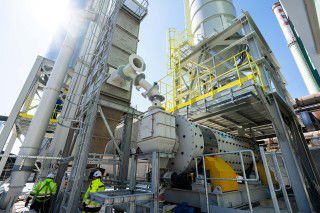This week the Financial Times cited that the growing collapse in the German housebuilding sector could spread through the wider economy. Germany's construction sector has plummeted since January 2023, dropping 47 per cent for newbuilds compared with the average in the last two years, despite Chancellor Olaf Scholz's annual build target of 400,000 flats. A 14-point action plan by the federal government may not be enough to stimulate the construction sector quickly enough to prevent the IMF from dropping Germany to the bottom of the economic growth rankings.
The property sector accounts for approximately a fifth of GDP and one in 10 jobs in Germany, reports Reuters. In September 2023, The Economist highlighted that German construction companies were on the brink of collapse. Rising raw material costs that are up 40 per cent since the pandemic and 10 straight interest rises by the Central European Bank have led to a loss of confidence and a scarcity of house buyers.
Facing a future with a lack of orders
The builders are in the front lines of the crisis with labour and wages threatened with the drop-off or cancellation of construction projects. While the bureaucracy of planning needs speeding up to help builders, ZDB Managing Director, Felix Pakleppa, representing 35,000 construction companies said, “To be able to switch into acceleration mode, you first need new orders. And these are becoming fewer and fewer.”
Order books and backlogs have declined quickly, while the 295,000 homes built last year are well below government target. Building permits fell 28 per cent in the first eight months of 2023, according to the statistics office. Since August 2022 apartment building permits have fallen by 36 per cent. Building permits for single-family units were down 28 per cent, while for two-family homes the drop was even sharper by 53 per cent, according to Reuters.
By October 2023, 22.3 per cent of German construction companies reported cancelled projects, the most since the Ifo think-tank began recording in 1991. A sign of the downward trend was brought into focus this month when construction of one of Germany’s tallest buildings was halted midway after the developer stopped paying the builder. The 64-storey Elbtower skyscraper in Hamburg stands half-built and is without activity.
Low cement demand expected to hit cement and wider building materials sectors
The likelihood of the German cement sector seeing a large drop-off in demand remain high. Buzzi’s 9M23 results suggest cement sales held up well in Germany with Dyckerhoff, Buzzi's subsidary, registering German net sales of EUR674.6m, up 11 per cent YoY. However, with house construction heading towards a standstill and non-residential construction also reeling from higher interest rates, cement volumes cannot be expected to be maintained.
While Holcim and Heidelberg Materials have stronger diversified building materials portfolios than most cement producers in Germany, the tailing-off in the construction industry is expected to impact on roofing, gypsum plasterboard, bricks, aggregates, ready-mix and mortar as well as cement.
The 14-point action plan
Hopes of a quick end to the sloping decline rest in the federal government’s 14-point action plan released in September 2023. This includes a mix of tax benefits, attractive subsidy programmes, the lowering of energy-saving standards, and simplified planning and approval procedures. The cement sector will also benefit from the clean production for heavy industry worth around EUR20bn, according to Allianz. The government has proposed an 80 per cent electricity price subsidy for heavy industry, but some construction companies have already gone under or closed operations in Germany.
